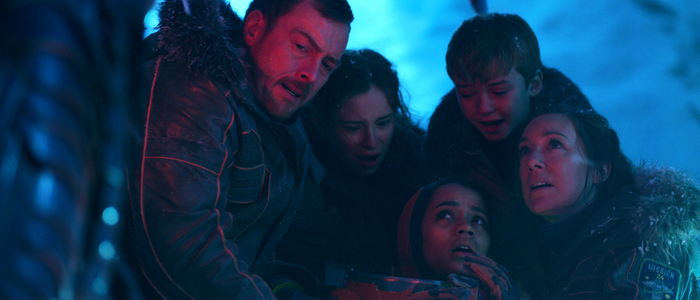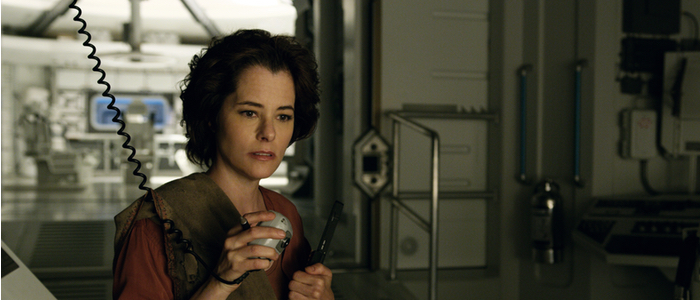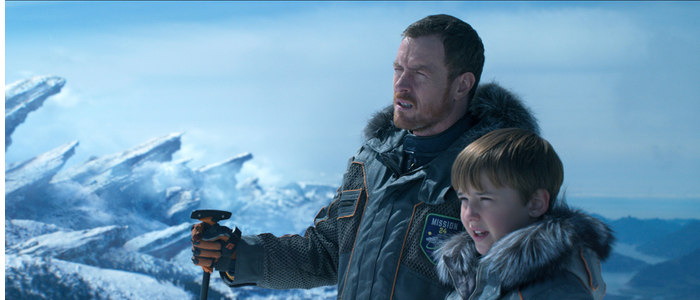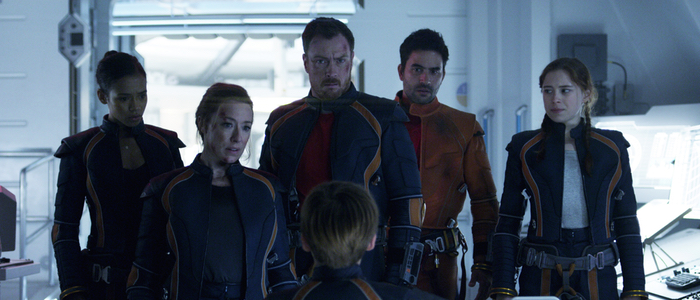‘Lost In Space’ Review: Netflix’s Space Adventure is ‘Lost,’ in Space
Netflix updates the classic series Lost In Space for a whole new generation, creating a formulaic yet entertaining saga enriched by complex characters. Our spoiler-free Lost In Space review is below.
The Space Family Robinson
Irwin Allen’s somewhat cheesy 1960s sci-fi program gets a cinematic upgrade for the Netflix age with Lost In Space. Employing production design that would be right at home in the rebooted J.J. Abrams Star Trek franchise, Netflix’s Lost In Space takes the raw materials from the original show, and molds them into an episodic drama featuring surprisingly complex characters.
This isn’t the first time Lost In Space received a big budget update. In 1998, the Stephen Hopkins-helmed Lost In Space blasted into theaters, bringing with it a blockbuster mentality and some truly terrible special effects. Netflix’s take, thankfully, improves on this formula in nearly every conceivable way.
This doesn’t mean Lost In Space’s mission is a complete success. The show suffers from a been there, done that atmosphere – we’ve seen this sort of thing before, in countless space adventure shows and movies. What makes Lost in Space work, however, is its rich cast of characters, all of whom are complex and well-crafted. Hell, even the damn robot is complex in this show.
Set in the not-too-distant future, Lost In Space wastes no time throwing its audience into the adventure. The Robinson family – father and former military man John (Toby Stephens), mother and aerospace engineer Maureen (Molly Parker), 18-year-old doctor Judy (Taylor Russell), super-sarcastic middle-child Penny (Mina Sundwall), and youngest, and shyest, child Will (Maxwell Jenkins) – crash onto a mysterious, uninhabited planet. Almost immediately, things go very, very wrong – Maureen’s leg is severely injured, Judy gets trapped in some ice, and Will gets separated from the family. It’s a jarring opening – there’s literally no set-up, and there’s almost a sense that perhaps we’ve jumped too far ahead and have started with a later episode rather than the start.
Employing quick-thinking problem solving, the Robinson clan works hard to save each other from catastrophe. They also get some unexpected help – during his separation from the family, Will saves the life of a strange, possibly alien robot. The robot proceeds to follow Will back to his family, and assist in the rescue of Judy. From here, Lost In Space is off to the races.
Each episode employs a similar formula – the Robinsons get in danger, and they have to work together to save each other before it’s too late. They’re not alone, however. There are more survivors who have crashed on this planet, and a community begins to take shape. There’s also the mysterious Dr. Smith (Parker Posey), who claims to be a psychiatrist but is clearly bending the truth. And then there’s Don West (Ignacio Serricchio), a smuggler that the show really wants to cast as their own Han Solo. They even give West a moment to sarcastically call Judy “Princess”, a la Han to Princess Leia.
All of these elements congeal into a fairly entertaining saga that unfolds leisurely over 10 episodes. Unlike some other Netflix shows, Lost in Space isn’t designed to be binged. This is not a 10-hour movie; it’s an episodic series that’s better experienced in spurts. Savor your journey with the Robinsons; don’t blast through it. It’ll be more rewarding in the end.
Lost, In Space
While the overall look of Lost In Space looks beamed over from J.J. Abrams’ Trek films, this isn’t the only Abrams influence present. In creating the new take on the series, Matt Sazama and Burk Sharpless perhaps took the Lost portion of the title a little too seriously. Lost in Space handles its exposition almost identically to Lost – that is, it employs constant flashbacks.
The first episode drops us right into the action, and it’s through these flashbacks that we begin to learn more about the Robinsons, and several other characters. It becomes apparent that Earth has become almost uninhabitable, and a select group of colonists have been selected to start a new life to a new home world.
We also learn that the Robinson clan wasn’t exactly a stable, happy family before blasting into space. Maureen and John are estranged, nearing divorce. As a result of this, John is practically a stranger to his kids, and part of the show involves father and children reconnecting as the adventure unfolds.
The flashbacks work well…at first. As they continue, however, it’s almost impossible to separate them from Lost. Lost made this approach seem fresh. Here, it’s derivative, and frequently frustrating. There are times where it comes off like a cheat – as if the writers are deliberately side-stepping rather simplistic exposition in order to shoehorn in another flashback.
Dr. Smith, I Presume
It probably won’t come as a surprise to anyone familiar with Parker Posey that her take on Dr. Smith is the best element of Lost In Space. The first season of the original Lost In Space portrayed Smith as a villain, but eventually, actor Jonathan Harris’ fey, whiny take on the character became more like comic relief.
Posey’s Smith is more complicated. She’s obviously not who she says she is, but her motives are an ever-present mystery. Perhaps the only real motive she has is self-preservation. Smith moves from one person to the next, constantly working to turn characters against each other. She’s Shakespeare’s Iago in an orange tracksuit.
This is a tricky character, and there were many ways Posey could’ve handled it. A part of me wishes the show had let Posey go into full over-the-top mode (like her work in Blade: Trinity, for example). Instead, Posey underplays it a bit – and that works, too. Her Dr. Smith is a emotionally unstable individual who has a great grasp on spinning lies. Part of the fun in watching Posey’s performance is the way she nimbly deflects questions and pulls answers seemingly out of thin air.
Smith’s doings are villainous, but Lost In Space is smart enough to not make the character seem reprehensible. The strength of the character lies within the way Posey makes Smith somewhat sympathetic. We can almost see her point at times. At the same time, we wish she would just stop trying to ruin everyone else’s lives. It’s a fascinating character, and Posey does a superb job.
Danger, Will Robinson
Netflix’s Lost In Space has a robot that’s worlds removed from the original series. No longer the amusing, rubber-armed, bubble-headed character warning, “Danger, Will Robinson!”, the robot is now a potential threat. Other characters are understandably leery of the very-powerful automaton. Yet the robot strikes up a friendship with the shy Will Robinson.
The friendship is a frequently touching element to the series – don’t be surprised if you find yourself growing empathetic with that robot, folks. In many ways, the robot becomes more of a father figure to Will than John. In one sequence, when Will teaches the robot to play catch, you can almost hear Linda Hamilton’s narration from Terminator 2: “It would never leave him, and it would never hurt him, never shout at him, or get drunk and hit him, or say it was too busy to spend time with him. It would always be there. And it would die, to protect him. Of all the would-be fathers who came and went over the years, this thing, this machine, was the only one who measured up. In an insane world, it was the sanest choice.”
In other ways, the robot is like a potentially rabid dog that finds shelter with a family while everyone else looks on in disdain. The robot listens to Will, but perhaps that isn’t the kind of power that should be placed in the hands of a small boy. Tensions begin to mount with other survivors as they look upon the relationship between Will and the robot with fear and disdain.
Character is Key
The many derivative elements borrowed from countless space sagas hurts Lost In Space. What saves it, however, is a set of complex characters. The main members of the Robinson family are all struggling in their own specific ways.
Maureen and John deal with their fractured relationship. Maureen, meanwhile, struggles with trying to take command of the mission and keep her family safe. While this is going on, John struggles to reconnect with his distant children. Judy suffers from PTSD from her near-death experience at the start of the show. Penny attempts to find her place as the middle-child who doesn’t have a specific skill-set, while also growing attracted to another crashed survivor on the planet. And Will has a constant sense that he doesn’t belong with his family.
These weaknesses and flaws make the Robinsons ultimately stronger. It’s easy to become engrossed in their stories, and their struggles, thanks to how rich their characterizations are. The cast handles all this admirably, with Mina Sundwall as a particular standout as the sarcastic Penny.
Lost In Space isn’t the best original series Netflix has created, but it is the type of show it’s fun to become wrapped-up in. Each episode builds upon the last while also remaining mostly episodic, and as a result, there’s a curious lack of urgency to the show. This isn’t a bad thing. Other Netflix series’ buckle under the pressure of being binge-worthy. Lost in Space knows how to take its time, and pull you along for the journey. You’ll likely be hooked by episode one, and won’t mind getting lost in Lost In Space.
***
Lost In Space debuts on Netflix April 13, 2018.
The post ‘Lost In Space’ Review: Netflix’s Space Adventure is ‘Lost,’ in Space appeared first on /Film.
from /Film https://ift.tt/2IlgBc8





No comments: